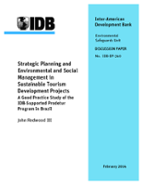Strategic Planning and Environmental and Social Management in Sustainable Tourism Development Projects: A Good Practice Study of the IDB-Supported Prodetur Program in Brazil
Date
Feb 2014
Over the past two decades, the Inter-American Development Bank (hereafter "the Bank") has gained considerable experience with regard to the promotion of sustainable tourism activities in Brazil. These include ecotourism in the Amazon region, but particularly in the less developed Northeast. This has entailed a valuable learning process with respect to the environmental impacts and management challenges associated with tourism development and investments to support it, leading to a significant evolution in the Bank's approach over time. As a result, much of what the Bank is currently doing in connection with its tourism development projects in Brazil can be characterized as good practice. This is especially the case both in terms of its strategic planning approach at the state and local levels, as well as the ways in which environmental considerations and components have been integrated, or mainstreamed, into overall project and subproject design and implementation. Based on a review of pertinent documents; interviews with Bank staff and selected borrowers; and field visits to two of the four active Prodetur projects (in the states of Ceara and Pernambuco), the purpose of this paper is to summarize these features of the Bank's approach to sustainable tourism in Brazil and to briefly describe how this approach has evolved over time. It will also identify a few areas where further improvements would be useful.



